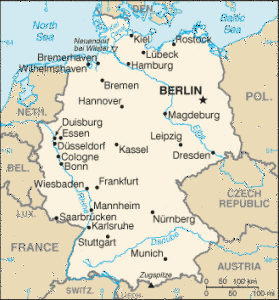The Trash Planet series highlights various countries around the world and how they handle their waste.
Germany leads the European nations in recycling, with around 70 percent of the waste the country generates successfully recovered and reused each year. To put that figure into perspective, consider this: In 2007, the U.S. was able to recover only about 33 percent of the waste generated that year.
To operate such a successful waste management system nationwide is certainly no small feat, but for the past several years the Germans have made it look easy. So how do they do it?
"Recycling is very important in Germany," says Günseli Aksoy, a 24-year-old mechanical engineering student at the Braunschweig University of Technology. "The people here are very conscientious."

Germany's recycling rate is one of the highest in the world - an respectable 70 percent. Photo: Faa.gov
And while the country's conscientious waste management strategy requires cooperation from the government, the industry and the citizens, it starts at the very beginning of the waste creation process – with the product manufacturers.
There are three simple components the manufacturers must consider: waste avoidance, waste recovery and environmentally compatible disposal.
By incorporating waste avoidance into industry, much of Germany's waste management becomes "invisible," as corporations are forced to re-think every aspect of manufacturing. Packaging, processes and disposal of items are all engineered with recycling and elimination of waste in mind.
Federal Waste Management Policy
In 1996, German lawmakers who were concerned about the country's growing number of landfills passed the Closed Substance Cycle and Waste Management Act, which requires businesses to eliminate waste production by implementing one or more of the three management strategies.
Waste avoidance is first priority because it encourages companies to design their manufacturing processes and packaging with elimination of wastefulness in mind. Second, waste that can't be avoided must be recycled or converted into energy. Lastly, waste that can't be recovered must be disposed of in a way that is environmentally safe.
The concept in which private industries are responsible for eliminating waste – and for covering the costs – is described as the "polluter pays" principle. In other words, those who create the waste are responsible for cleaning up the mess. The U.S. has a "consumer pays" policy, in which waste management is funded by taxpaying citizens.
Germany's three-point strategy doesn't apply to just the country's solid and packaging wastes, but also to liquid, gaseous, hazardous, radioactive and medical wastes. The efforts have been hugely successful; according to the German Federal Statistical Office, between the years 1996 and 2007, the country has reduced its total net waste amount by more than 37.7 million U.S. tons.
rest http://earth911.com/news/2009/07/13/trash-planet-germany/

No comments:
Post a Comment